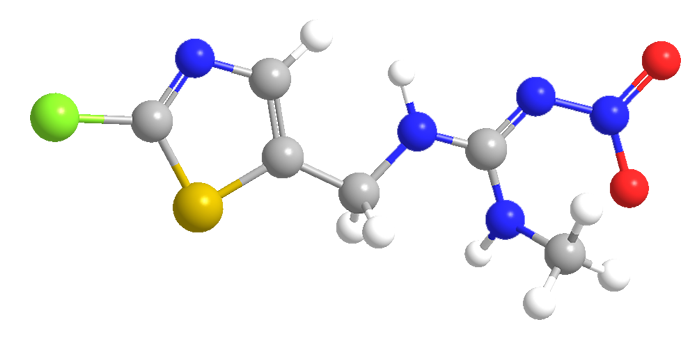

Clothianidin is a neonicotinoid insecticide that was developed jointly by Takeda Chemical Industries and Bayer. Neonicotinoids were developed to replace nicotine, which is an effective insecticide but degrades too rapidly to be practical for large-scale use. Neonicotinoids also replaced older pesticides that were harmful to humans and other mammals.
Recently, the use of neonicotinoids has been criticized because they are toxic to nontarget insects, especially honeybees. In 2013, the European Union (EU) issued a 2-year ban on clothianidin, thiamexotham, and other neonicotinoids on crops that attract bees. But the US Environmental Protection Agency ruled that the data used by the EU were inconclusive, and it did not ban neonicotinoids.
Later in 2013, a study conducted by F. Pennacchio and co-workers at the University of Naples Federico II established links between clothianidin exposure and two bee disorders: colony collapse disorder and deformed wing virus. This finding may lead to additional restrictions on the agricultural use of neonicotinoids.
MOTW update: June 03, 2019
Clothianidin and thiamethoxam were the Molecules of the Week for February 17, 2014 and October 15, 2012, respectively. Both are neonicotinoid insecticides that during the past decade have come under regulatory pressure because they are toxic to honeybees. Finally, this past week, the US Environmental Protection Agency canceled the registrations for 12 formulations that contain one or the other of these pesticides.
MOTW update:
February 17, 2020
Clothianidin is a nicotinoid pesticide that pose neurotoxic risks to humans and wildlife, especially honeybees. Nonetheless, in an interim decision announced in January, the US Environmental Protection Agency is allowing continued use of the pesticides, with some restrictions yet to be announced. This action is in contrast to the European Commission’s 2018 ban on these and other nicotinoids for outdoor use.
MOTW update:
May 14, 2018
Clothianidin, imidacloprid, and thiamethoxam were the Molecules of the Week for February 17, 2014, August 25, 2014, and October 15, 2012, respectively. All three are neonicotinoid pesticides, and all three have been found to contribute to the worldwide die-off of honeybees. Use of these pesticides has been gradually restricted during the past several years, but now the European Union is about to ban them from all outdoor uses. Will the United States follow suit?

Learn more about this molecule from CAS, the most authoritative and comprehensive source for chemical information.
Molecule of the Week needs your suggestions!
If your favorite molecule is not in our archive, please send us a message. The molecule can be notable for its current or historical importance or for any quirky reason. Thank you!
Stay Ahead of the Chemistry Curve
Learn how ACS can help you stay ahead in the world of chemistry.

